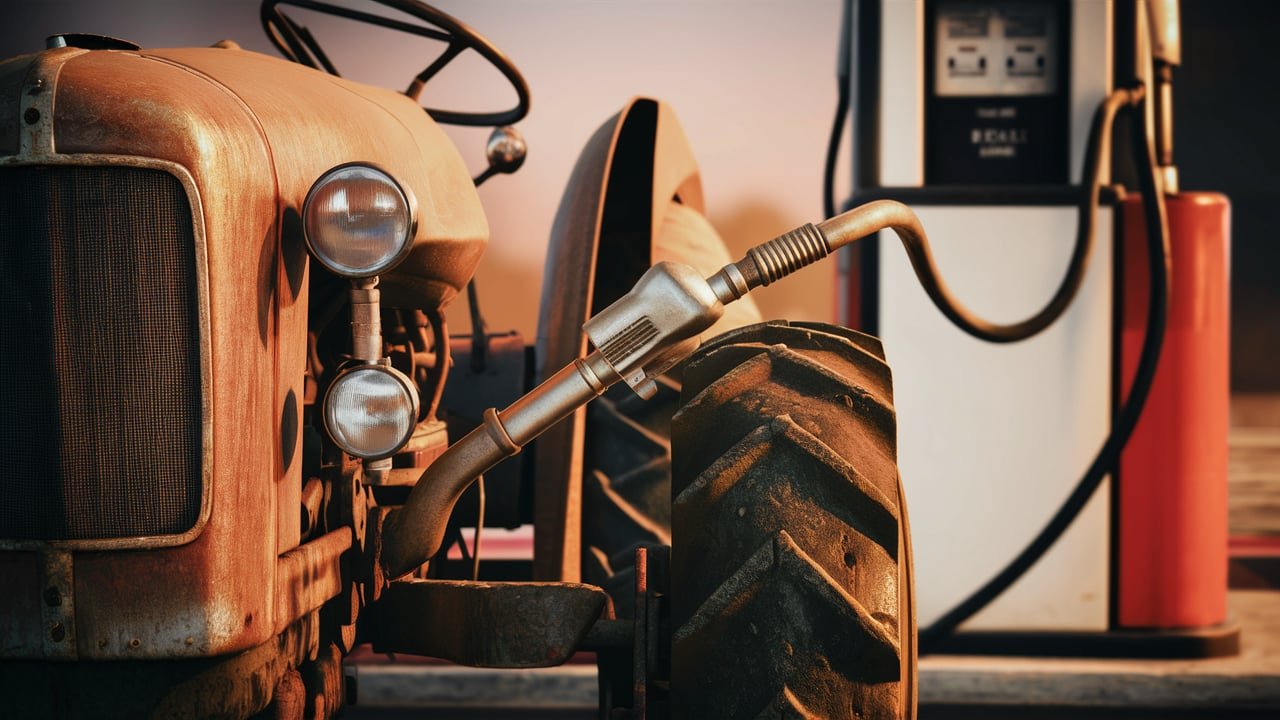Fuel – the lifeblood of agricultural machinery, like the heartbeat that keeps a tractor in working order. Picture this: the hum of the engine, the power beneath your feet, all deriving from that fundamental liquid source. Yet, what happens when this vital flow gets interrupted?
Enter the world of troubleshooting – a quest to decipher why your trusty companion is not receiving its essential sustenance. In this technical dive into ‘Why Your Tractor Is Not Getting Fuel,’ we unravel the mysteries behind stalled engines and sputtering progress.
Delving into the intricate web of fuel-related dilemmas demands clarity and methodical attention. The roadmap to restoration starts with understanding; pinpointing that elusive culprit causing fuel deprivation to your steadfast machine.
Through systematic analysis and keen observation, this guide seeks to arm farmers, machinery operators, and the mechanically-inclined with an arsenal of insights into diagnosing and rectifying issues affecting their tractors’ fuel intake.
Step-by-step, we navigate through common fuel system hitches, dissect electrical intricacies, explore fuel line maintenance protocols, encounter diesel-specific considerations – all aimed at reviving your tractor’s thirst for movement across vast fields and rugged terrains. Let’s harness knowledge as our tool and embark on a journey towards equilibrium in tractor functionality.
Common Fuel System Issues.
When your tractor is experiencing fuel delivery problems, common fuel system issues like clogged fuel filters, a faulty fuel pump, or the presence of air in the system could be at play. Clogged fuel filters are notorious culprits for impeding proper fuel flow.
These filters trap debris and contaminants, eventually restricting the passage of clean fuel to the engine. To address this issue, start by locating your tractor’s fuel filter. It is usually situated between the fuel tank and the engine. Once found, carefully remove it and inspect for any visible blockages or dirt accumulation. If clogged, replace it with a new filter to restore efficient fuel flow.

A faulty fuel pump can also disrupt the smooth operation of your tractor’s fuel system. Symptoms such as sputtering engine performance or difficulty starting may indicate a malfunctioning pump. To test its functionality, first ensure that power is reaching the pump by checking electrical connections.
Then, employ a pressure gauge to measure the pressure output of the pump according to manufacturer specifications. Any significant deviation from these measurements suggests a failing pump that requires replacement to maintain proper fuel delivery.
In some cases, air finding its way into the fuel system can create havoc for your tractor’s performance. Air bubbles within the system often result from leakages in connections or hoses that introduce air instead of pure diesel into the engine.
Bleeding out air involves locating bleed points on your tractor’s injector lines or pumps and releasing any trapped air until only diesel flows through the system smoothly without interruptions.
By addressing these common fuel system issues promptly and accurately diagnosing their root causes, you can ensure that your tractor receives an uninterrupted supply of clean and adequate fuel for optimal operation on the field.
Electrical System Checks.
For your tractor’s fuel system to operate optimally, a robust electrical system is paramount. The battery plays a critical role in providing the necessary power for fuel delivery. A weak or faulty battery can hinder the fuel supply process, leading to starting issues or inconsistent engine performance.
To ensure your battery is up to the task, start by checking its health regularly. Test the battery voltage using a multimeter and verify that it meets the manufacturer’s specifications. Should the voltage be low, consider recharging or replacing the battery to prevent any disruptions in fuel delivery.
Alongside the battery, conducting thorough wiring inspections is crucial in troubleshooting fuel supply problems. Damaged or frayed wires can cause intermittent connectivity issues that disrupt the flow of electricity needed for proper fuel injection.
During inspections, pay close attention to exposed wires, signs of wear, or areas where rodents may have chewed through insulation – all potential trouble spots that could impact your tractor’s ability to receive fuel effectively. By meticulously scrutinizing and promptly addressing any compromised wiring, you can safeguard against unexpected breakdowns due to electrical failures.

Testing relays and solenoids forms another integral aspect of ensuring a healthy electrical system for efficient fuel delivery in tractors. These components act as gatekeepers for electricity within the fuel system, controlling crucial functions like activating pumps or regulating pressure.
Faulty relays or solenoids can disrupt this intricate network, causing fuel supply issues that might manifest as engine stalling or poor performance under load. Regularly testing these components with a multimeter can help identify anomalies before they escalate into more significant problems, allowing you to replace them proactively and maintain consistent fuel flow throughout your tractor’s operations.
By prioritizing meticulous checks on your tractor’s battery health, conducting comprehensive wiring inspections, and testing relays and solenoids regularly, you bolster the reliability of its electrical system – a foundational element for seamless fuel delivery.
Incorporating these steps into your maintenance routine not only enhances operational efficiency but also minimizes downtime resulting from avoidable electrical malfunctions affecting your tractor’s ability to receive consistent fuel supplies.
Fuel Line Maintenance.
When troubleshooting why your tractor is not getting fuel, one crucial aspect to examine is the fuel line system. Begin by visually inspecting the fuel lines for any signs of wear and tear such as cracks, leaks, or blockages that can hinder the smooth flow of fuel.
Even a small crack in a fuel line can lead to significant issues, so thorough inspection is essential. For example, imagine a scenario where a farmer notices that their tractor sputters and stalls intermittently during operation. Upon inspection, they find a kink in the fuel line causing inadequate fuel flow to the engine.
Cleaning injection nozzles is another critical maintenance task within the fuel line system. Clogged injection nozzles can disrupt the precise delivery of fuel to the engine cylinders, resulting in reduced performance and efficiency.
By following manufacturer-recommended cleaning procedures for these nozzles, operators can ensure optimal fuel delivery. Consider a situation where a mechanic diagnoses poor tractor acceleration due to partially blocked injection nozzles after conducting routine maintenance.

Furthermore, checking the tank ventilation system plays a fundamental role in maintaining proper fuel flow. Adequate tank ventilation prevents vacuum formation inside the tank, allowing for continuous and smooth fuel supply to reach the engine.
An example illustrating this point could be an agricultural operator experiencing difficulties starting their tractor due to a vacuum-sealed tank caused by clogged ventilator components. Regularly inspecting and cleaning these ventilation elements ensures seamless tractor operations by preventing potential fuel supply disruptions related to inadequate airflow.
In conclusion, incorporating thorough inspections of fuel lines, regular cleaning of injection nozzles, and ensuring proper tank ventilation are vital steps in maintaining a healthy and efficient fuel delivery system for tractors.
By diligently attending to these maintenance tasks, farmers and machinery operators can mitigate issues related to inadequate fuel supply effectively. Remember that proactive maintenance schedules significantly contribute to preventing unexpected downtimes caused by neglecting these critical components of the tractor’s fuel system.
Diesel Specific Concerns.
When troubleshooting fuel-related issues with your tractor, paying attention to diesel-specific concerns is crucial. Firstly, the quality of diesel fuel can significantly impact your tractor’s performance.
Using clean and uncontaminated diesel ensures smooth running of the engine without any interruptions due to impurities. For instance, water contamination in diesel fuel can lead to injector problems and reduced engine efficiency, emphasizing the importance of regular fuel quality checks.
Another essential aspect is testing glow plugs, especially for those who operate their tractors in colder climates. Glow plugs are vital for cold starting efficiency by pre-heating the combustion chamber in diesel engines.
Checking these plugs regularly ensures that they are functioning optimally, providing reliable ignition during chilly mornings on the farm. For example, a malfunctioning glow plug can cause difficult starts and increased engine wear due to prolonged cranking in cold conditions.
Furthermore, correct calibration of the injector pump is imperative for maintaining efficient fuel delivery within the engine. The injector pump regulates the precise amount of fuel injected into each cylinder at optimum timing intervals.

Calibrating it correctly helps ensure proper combustion and prevents issues like poor engine performance or excessive smoke emission. An example could be an incorrectly calibrated injector pump leading to uneven power output across cylinders, affecting overall tractor productivity.
In conclusion, addressing diesel-specific concerns such as monitoring fuel quality, testing glow plugs, and calibrating injector pumps are essential steps in ensuring your tractor operates smoothly and efficiently.
By incorporating these practices into your regular maintenance routine, you can prevent potential fuel-related problems down the line. Remember that seeking professional assistance when dealing with intricate repairs related to these diesel systems is always advisable to maintain the longevity and performance of your agricultural machinery.
Conclusion.
In conclusion, regular maintenance practices are essential to prevent future fuel-related issues in your tractor. By adhering to a routine inspection schedule for fuel filters, fuel lines, electrical components, and the diesel system, you can identify potential problems early on and take corrective actions promptly.
Implementing a proactive approach to maintenance not only ensures the efficient operation of your tractor but also prolongs its lifespan by safeguarding against major breakdowns caused by fuel system issues.
If despite thorough troubleshooting, the source of the problem remains elusive or if repairs require specialized knowledge and tools, it is advisable to seek professional help.
Experienced mechanics or technicians can conduct in-depth diagnostics and execute complex repairs with precision, minimizing downtime and ensuring that your tractor operates at peak performance levels.
Remember, when it comes to intricate fuel system intricacies or electrical components, professional intervention can save time, resources, and ensure the safety of both the operator and the equipment.









